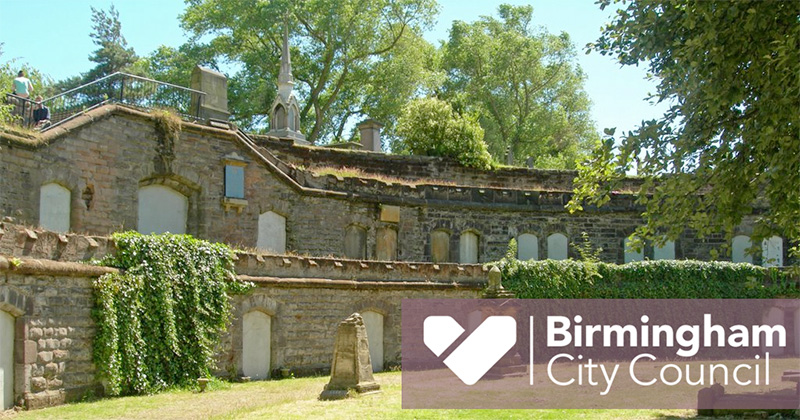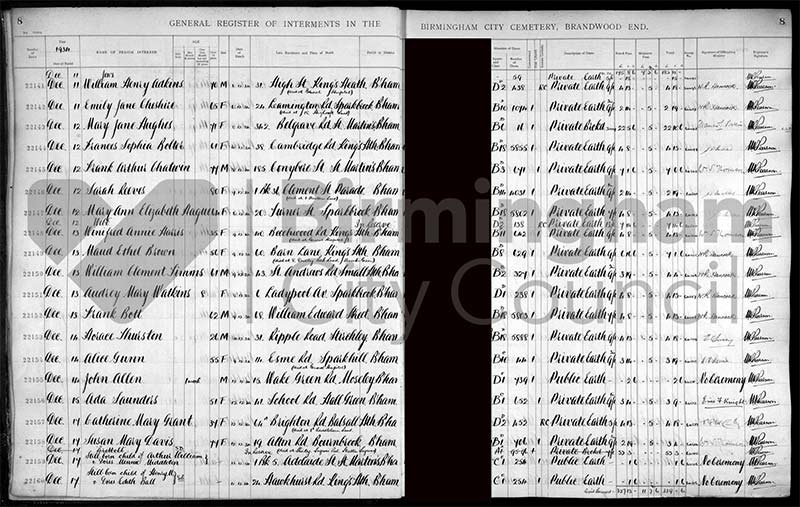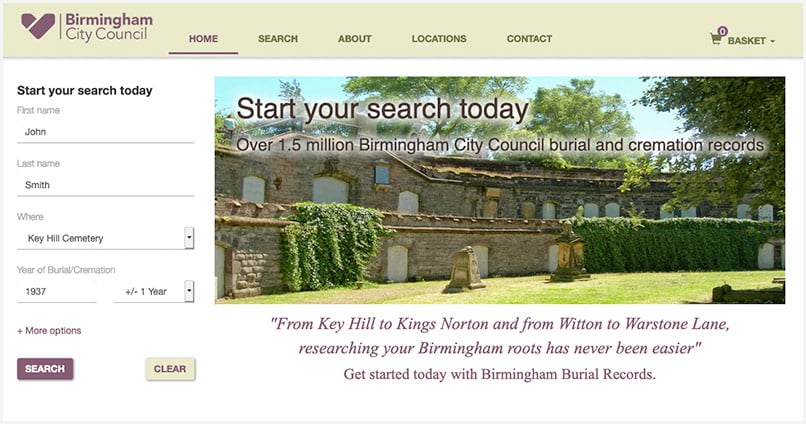
So, you have a vast physical record of all the interments in your jurisdiction, and it’s vital that these are always accessible, but you rely only on heavy books and handwritten entries – some dating as far back as the 1800s!
Volumes upon volumes of valuable and irreplaceable content. Does this sound familiar? Well, it was definitely the case for Birmingham City Council; the largest local authority in the UK, with a whopping six separate administration offices. They called on TownsWeb Archiving to digitise their burial records to ensure preservation and accessibility. Working closely together, and after detailed consultation, we were able to come up with a user-friendly, accurate and tailor-made package, just for them. This fell into two distinct parts:
Phase 1 - Digitisation and TranscriptionThis saw the digitisation of all records and the transcription of their burial and cremation records, to make searching quicker and easier. What issues were they facing? |
What issue were they facing?
Manual searching
For Birmingham City Council this involved staff members having to manually look up the details of an enquirer’s deceased relative, often across multiple books, and this was something that took up valuable time and resources. Digitisation would grant access to the public who could then search the records for themselves, at the touch of a button. No more appointments necessary! As an added bonus, the new search system meant that searches could also be done at any one of the authority’s six offices.
Preservation
When it comes to cremations and burials, we are looking at history as it relates and impacts people today; often the most significant record of where and when a person has been laid to rest. This might be a loved one or, indeed, the vital link that determines someone’s roots and heritage. This sense of identity is a fundamental question to the human existence: who are we and where do we come from? Being able to help facilitate the answer to these questions has always been an honour for TownsWeb Archiving. Digitisation is the single most reliable method of capturing history and preserving it for generations to come.
In this case, we were tasked with digitising all books for disaster recovery on behalf of Birmingham City Council, with the burial records going on to be made public.
When records are in constant use – can we afford to not have them to hand?

Of course, the records needed to remain fully functioning and accessible at all times and, understandably, this was a primary concern for Birmingham City Council. We were able to discuss these continuing obligations to the public and how this service could be maintained. TownsWeb Archiving was going to be in possession of the records and, given our many years of experience with searching and accessing burial archives, we could see no reason why the searches couldn’t continue to be performed by us, on Birmingham City Council’s behalf. This meant the archives were only ever a phone call away. In addition, once the archives were digitised and awaiting transcription and publishing, Townsweb Archive provided a copy of all the images, plus our Book Explorer software, to instantly provide digital access to the essential burial registers.
Going to tender - finding the right company for the job
It will be of no surprise that archiving records can be expensive, despite being well worth it in the long run. The question is often, how do we cover the costs of this project? There is financial help available if certain conditions for funding are met. For Birmingham City Council, their first step was to put the project out to tender, and this they did twice. TownsWeb Archiving have an extensive history of success in digitising and can offer a number of bespoke services that ensure an efficiency that meets, but does not exceed, funding budgets.
What Was The Solution?
Digitisation & Data Protection

Birmingham City Council were keen to digitise their large format, bound, fragile registers and maps using our planetary scanners, producing both tiff and jpeg formats in both colour and greyscale. TownsWeb Archive have managed the digitisation of burial records for more than 71 different local authorities since 2006 and so, as experts in our field, we were able to produce preservation quality master images to national archival standards. This included the safe collection of material from six locations across Birmingham and secure storage at our Northamptonshire premises. Though all records were digitised, to ensure a fully preserved archive, we were able to provide a redacted copy too, so that only the necessary fields would be accessible to the public, without revealing data protected material.
Transcription and key search terms
Transcription involves the typing up of any relevant information and metadata that needs to accompany a digital archive. It is an important part of the process, but it can be costly. However, as Birmingham City Council’s project was to preserve their burial archives and make them more easily accessible to staff (and, for the first time, directly accessible to the public), it was sufficient that only the key search terms were transcribed. This meant a high level of search performance at a cost that was always mindful of funding limitations.
Going forward – a continuing responsibility
So began the discussion about the future for burial archives at Birmingham City Council. Digitisation would be a continuing responsibility with the need to update new information relating to burials and cremations over time. There were also other options available, to include making cemetery plot plans available, and so scheduling digital reviews was considered a necessary and prudent part of the ongoing digital process.
It was such a fantastic opportunity working with Birmingham City Council on Phase 1 of this project and our case study celebrates what a great success the project turned out to be. Here’s what our managing director had to say about the experience:
It was a pleasure to work with Birmingham Council on the digitisation of their registers and maps. Logistically it was relatively complex as we needed to arrange the collection and return of this material from 6 different cemetery offices across the city and with each office referring to the books on a daily basis it was important that we digitised and returned them quickly.
Once the digitisation was complete, we provided each of the 6 offices with our Book Viewing software running locally on their Windows PC’s. I personally provided the software training and it was met with joy and enthusiasm as staff no longer needed to physically handle the large, cumbersome and heavy registers – plus there was a sense of relief given that they were now preserved & backed up. The software allowed them to open and flick through every page within every register across all 6 sites. And once we transcribed the records, the deceased names could be searched too. They were absolutely delighted with how quickly they could now deal with enquiries!
TownsWeb Archiving Managing Director
What's next for the Birmingham City Council
Publishing burial records and revenue generation (Phase 2)

Birmingham City Council’s next step was to decide how to go about publishing their digital records and discover more about the opportunities that this would create for generating revenue. Read on to discover how the digital journey continued for Birmingham City Council, and how this was supported through our management software, PastView Chronicle.
To read about phase 2, click here.
Get in touch & find out more
If aspects of this case study resonate with you, take a look at TWA's Cemetery Solution - A five phase process or learn more about the exciting projects we have worked on. If you are in a quandary as to how you’re going to protect your own burial and cremation records, then please do get in touch. You can use the online contact form or, indeed, telephone our offices here at TownsWeb Archiving. We look forward to hearing from you.


 USE OUR ONLINE
USE OUR ONLINE








